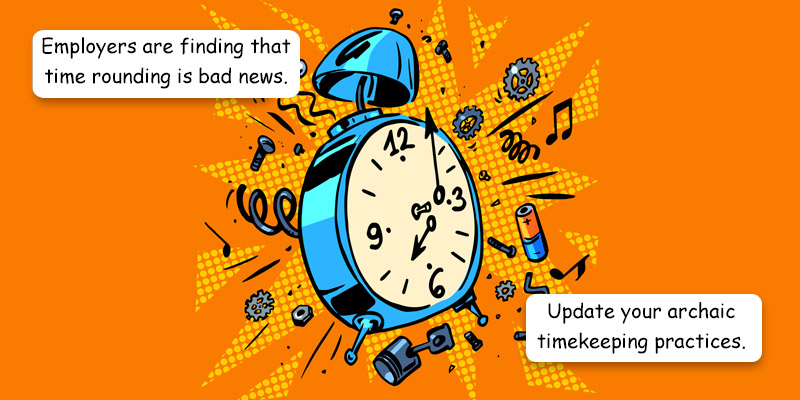Time rounding. A practice that once had a purpose, should go the way of the dinosaurs. 
Back in the caveman days, when an employee stuck their timecard in a dinosaur’s mouth to punch in and out, payroll administrators needed a quick way to total hours. The fastest way to do that was to round punches; Looking at a shift and seeing 9:06 a.m. to 5:03 p.m. or 8:55 a.m. to 5:07 p.m. and calling them both as eight-hour days. With modern technology, that is no longer the case. Automated timekeeping systems are able to calculate punches to the minute without any time or burden on the payroll administrator. Perfect!
But, employers still want to round punches. Why? I think the best explanation I can find is that an employee may feel shorted if they only have 39.88 hours for the week, andon the flip side, an employer may get upset that they have to pay overtime when the employee worked 40.09 hours. Yes, overtime for the five minutes the employee worked more than 40 hours in the week. Who cares? Pay it.
Here is why. Rounding is going to be unfair to someone. I have seen companies where the employees figured out the rounding rules and they exploited the rules where they systematically punch in and out in their favor. “Wait! Don’t punch out at 3:07,” someone will tell their new co-worker. “Wait until 3:08 and you will get paid an extra 15 minutes” (for pausing at the clock for less than 60 seconds.) If an employee takes that pause at the clock for just a minute, four times a week, they get an extra hour’s pay. Yep, I have seen it done. Employer loses.
Rounding can also be unfair to the employee. Employees don’t like when that happens and guess what happens next? A Fair Labor Standards Act claim and lawsuit. Employer loses again.
A couple of big lawsuits have come up recently where the employer lost, as the result of rounding. Last year, it was Home Depot that had to pay $72.50 million to settle a lawsuit. The lawsuit covered a few claims, but 9% of the latter was because they rounded punches to the nearest quarter of an hour. This past month, Providence Health & Services, a not-for-profit hospital system, was ordered to pay nearly $100 million, with another $100 million in possible punitive damages. This lawsuit also contained multiple claims, but the one we are talking about is timeclock rounding. Rounding to the nearest 15 minutes.
The moral of the story is as follows: if your practice is to touch the employee’s punch in any way, including rounding, adjusting to their schedule, automatic lunch break and so on, DON’T DO IT. Pay the employee for their time worked to the minute. If that requires you to pay the employee overtime for working a few minutes over 40 hours, then just do it. It’s not worth the exposure to liability to do anything otherwise.
While we make every attempt to ensure the accuracy and reliability of the information provided in this document, the information is provided “as-is” without warranty of any kind. Romeo Chicco or PayMaster, Inc does not accept any responsibility or liability for the accuracy, content, completeness, legality, or reliability of the information contained. Consult with your CPA, Attorney, and/or HR Professional as federal, state, and local laws change frequently.

